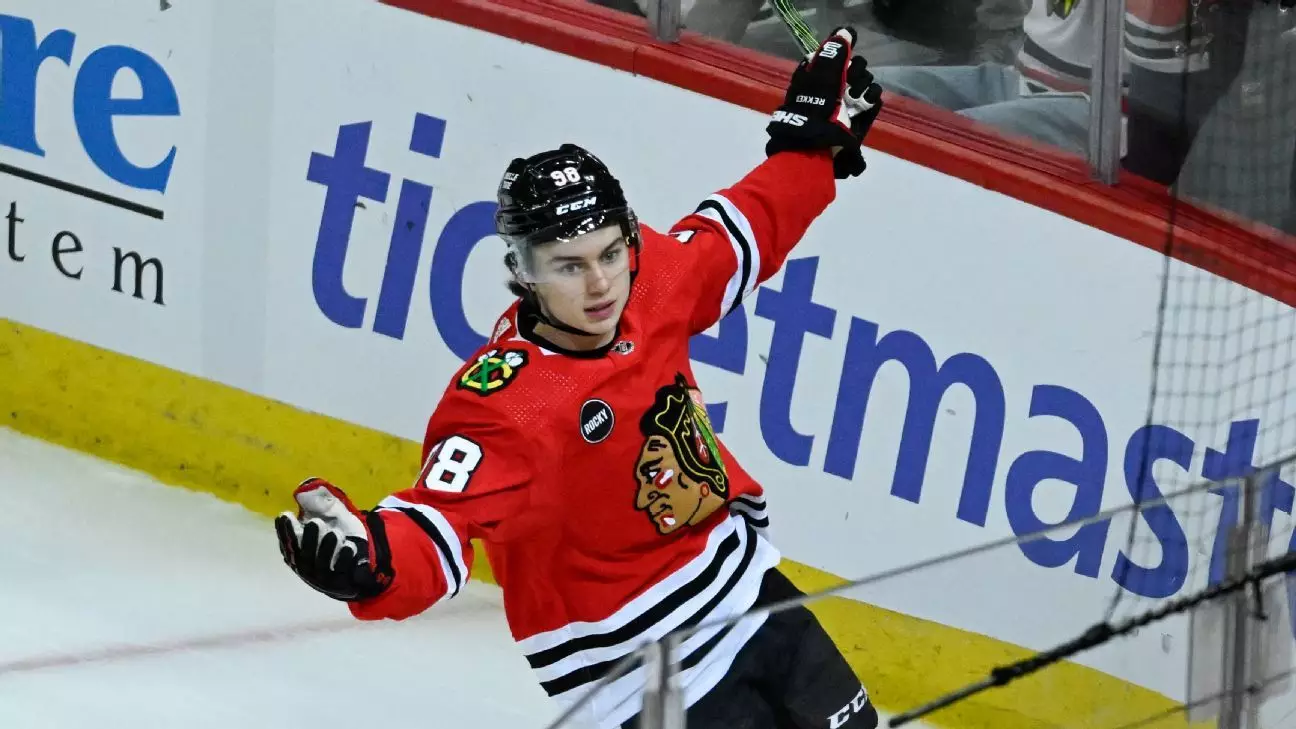In a recent game against the Pittsburgh Penguins, the Chicago Blackhawks welcomed back their rookie center, Connor Bedard, after a 14-game absence due to a broken jaw. Despite the team’s 4-1 loss, Bedard showcased his skills and resilience on the ice. This article delves into Bedard’s triumphant return, his impact on the game, and his determination to excel as a rookie in the NHL.
After a sluggish start, Bedard proved his worth by assisting Philipp Kurashev’s second-period goal. With a deft pass through traffic, Bedard set up Kurashev, who managed to skillfully dump the puck past goaltender Alex Nedeljkovic. The crowd at the United Center erupted in applause for this year’s top draft pick, highlighting the anticipation surrounding Bedard’s return.
Although Bedard had a commendable performance, his return to the ice did not begin as smoothly as hoped. Losing the opening face-off to seasoned veteran Sidney Crosby, Bedard struggled to maintain contact with the experienced center. This misstep allowed Crosby to deflect Marcus Pettersson’s pass, resulting in an early goal just 15 seconds into the game. Bedard faced another setback when Reilly Smith scored for the Penguins, beating the Blackhawks’ goaltender with a precise wrist shot. These early challenges tested Bedard’s resilience and served as a reminder that the NHL is a league where even the most promising rookies can face adversity.
An Early Return
Bedard’s return to the game was earlier than initially anticipated. After fracturing his jaw six weeks prior, the Blackhawks had initially planned for Bedard’s return the following week. However, the young center’s determination and dedication to his recovery allowed him to step back onto the ice sooner than expected. Bedard’s eagerness to return was evident in his statement, where he expressed his desire to come back earlier but also recognized the importance of prioritizing his safety and well-being.
Impressive Stats and Skills
Despite missing over a month of gameplay, Bedard’s return showcased his impact on the ice. His assist in the recent game not only contributed to his team’s offense but also placed him ahead of Minnesota’s Brock Faber in the race for rookie scoring. With 34 points to his name, Bedard currently leads all NHL rookies in scoring, solidifying his place as a formidable talent in the league. His ability to create opportunities for himself in tight situations impressed even veterans like Crosby, who acknowledged Bedard’s skill in making something out of nothing.
A Determined Comeback
Bedard’s journey back to the ice involved rigorous training and preparation. Despite not participating in full-contact practices, Bedard continued skating with the team and sought to push himself as much as possible. Before his return, he underwent surgery and immediately began advocating for a return to on-ice work. The Blackhawks’ coaching staff recognized Bedard’s commitment and put him through contact drills to ensure his readiness to face the challenges of competitive gameplay.
Looking Ahead
Although Bedard’s return was highly anticipated and celebrated, the team and coaching staff acknowledge that his presence alone cannot guarantee success. Coach Luke Richardson emphasized the importance of continued hard work and collective effort. While Bedard’s talent is undeniable, the Blackhawks understand that relying solely on his scoring ability is not the path to victory. The team needs to maintain their dedication and consistently strive for improvement in all aspects of the game.
Connor Bedard’s return to the Chicago Blackhawks after an extended absence due to a broken jaw is a testament to his resilience and determination. Despite facing early setbacks, Bedard showcased his skills through an impactful assist and demonstrated his ability to adapt to challenging situations. As the NHL’s leading rookie scorer, Bedard’s return is an exciting development for the Blackhawks and their fans. However, it is crucial to remember that success in the NHL requires a collective effort, and Bedard’s return serves as a reminder that the team must rely on more than just one player to achieve their goals.


Leave a Reply